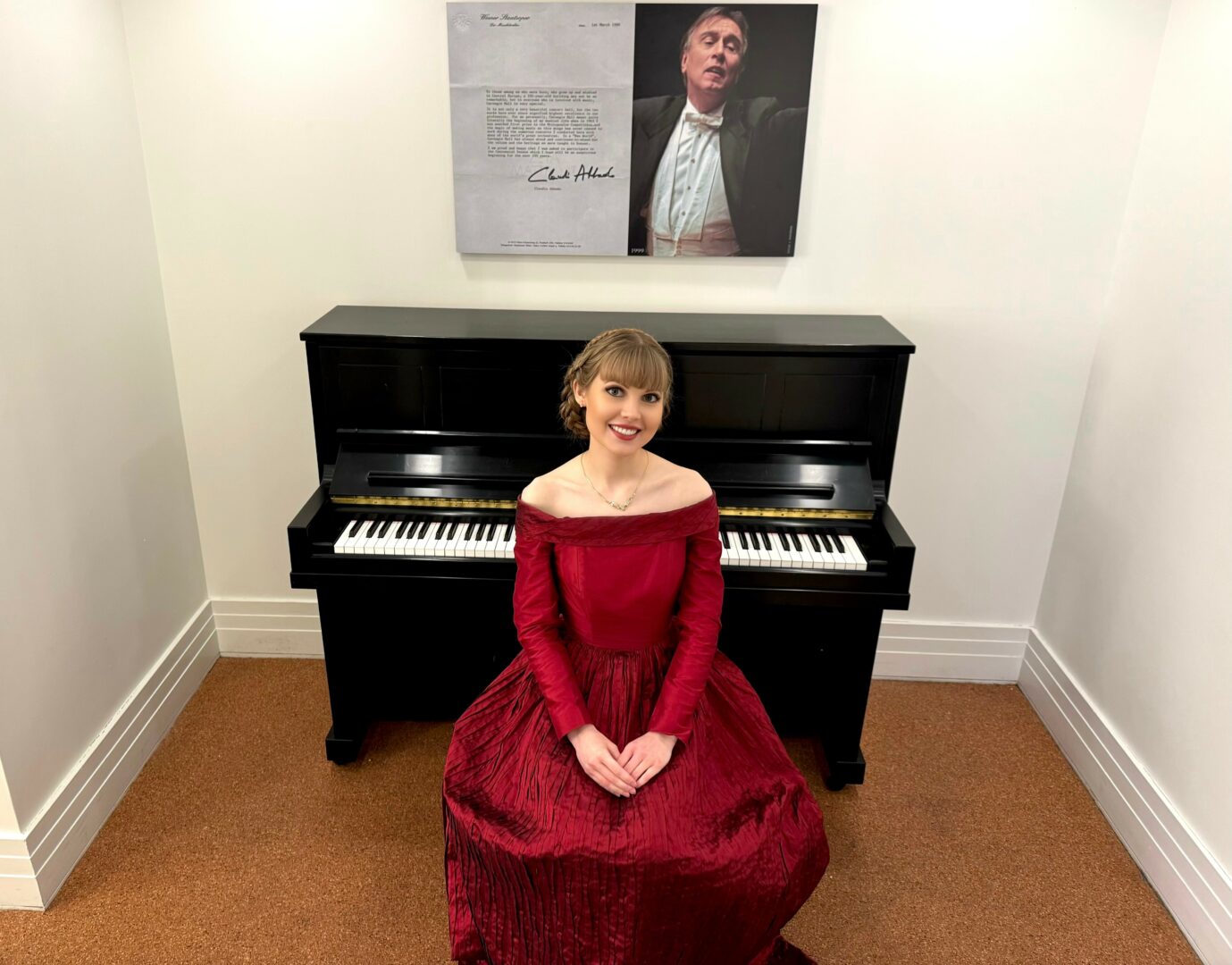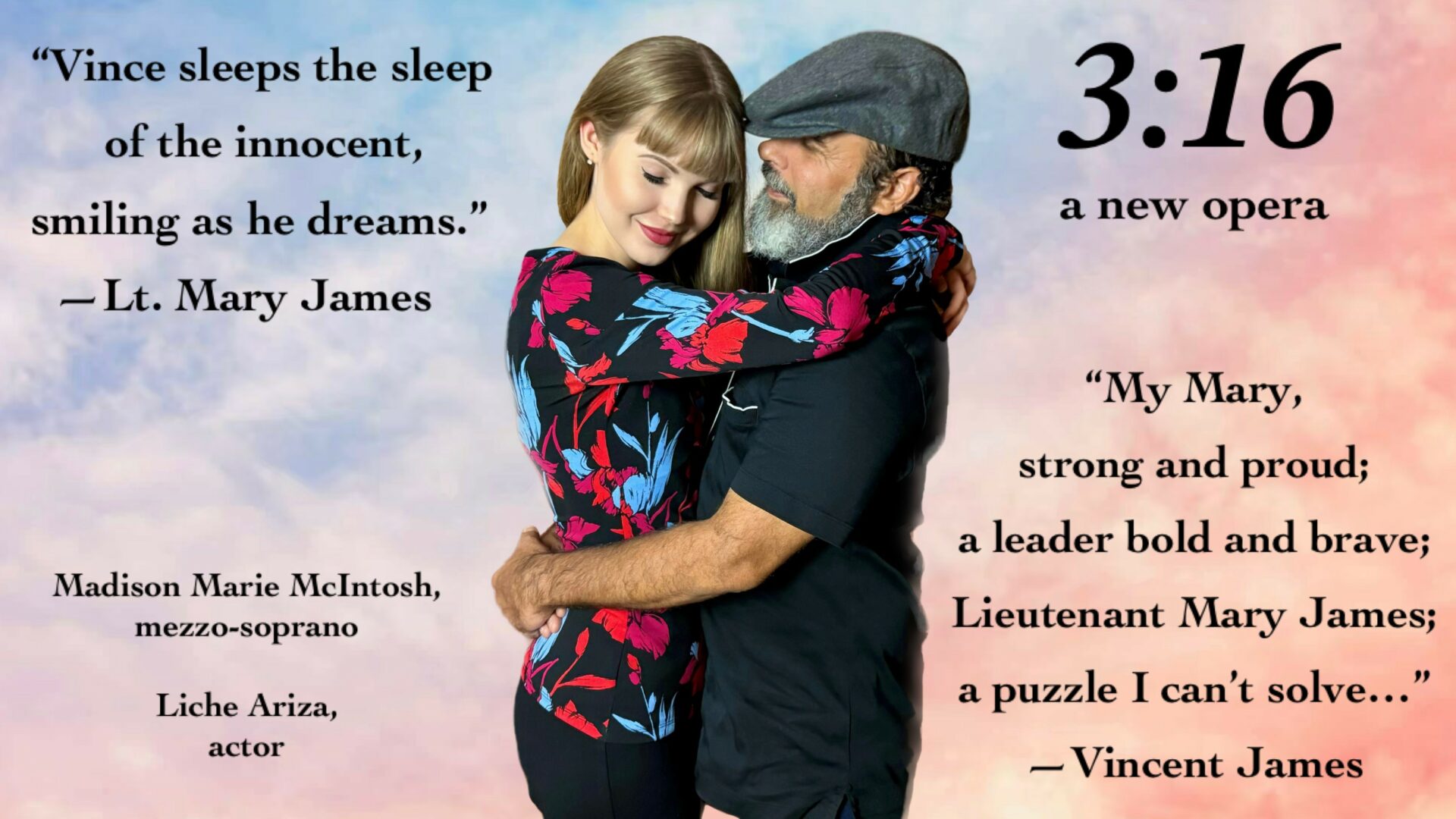We recently had the chance to connect with Madison Marie McIntosh and have shared our conversation below.
Madison Marie, really appreciate you sharing your stories and insights with us. The world would have so much more understanding and empathy if we all were a bit more open about our stories and how they have helped shaped our journey and worldview. Let’s jump in with a fun one: What do you think is misunderstood about your business?
There seems to be an unspoken belief that practicality is an enemy of art. Some young musicians are led to believe that true artists make art because they love it, whether or not they will ever get to share it with the public. For example, musicians are sometimes encouraged to work on new repertoire even before performance opportunities have materialized. That can be useful for a voice student who wants to get some standard repertoire under his belt or a young composer who is just starting to build a portfolio, but it can eventually become dissatisfying. Music is our profession, and sheer love of the art does not build a career that can support an artist.
On the other hand, there are people who consider it foolish for professional musicians to perform pro bono — when feasible — in order to support important causes and to promote the work of emerging composers. In my opinion, this is a sad misconception. I mentioned that sheer love of art couldn’t build a career; but love of neighbor, realized in actions and not just feelings, can help to build something invaluable.
Can you briefly introduce yourself and share what makes you or your brand unique?
I am very grateful to have been given a wide variety of professional opportunities. In June 2023, I made my Carnegie Hall mainstage debut as the mezzo-soprano soloist in Dan Forrest’s 𝘙𝘦𝘲𝘶𝘪𝘦𝘮 𝘧𝘰𝘳 𝘵𝘩𝘦 𝘓𝘪𝘷𝘪𝘯𝘨, presented by MidAmerica Productions during the company’s 40th Anniversary Season. Since that time, I’ve returned to Carnegie Hall as the alto soloist in Bach’s 𝘔𝘢𝘨𝘯𝘪𝘧𝘪𝘤𝘢𝘵, BWV 243; Vivaldi’s 𝘔𝘢𝘨𝘯𝘪𝘧𝘪𝘤𝘢𝘵, RV 610; and Monteverdi’s 𝘔𝘢𝘨𝘯𝘪𝘧𝘪𝘤𝘢𝘵 𝘢 𝘴𝘦𝘪 𝘷𝘰𝘤𝘪. I have performed roles with opera companies such as Caramoor, the Rossini Opera Festival in Pesaro, Teatro Nuovo, Sarasota Opera, Teatro Grattacielo, and the Phoenicia International Festival of the Voice and sung in concerts and other events presented by Florida Grand Opera, Fort Worth Opera, and the Kravis Center for the Performing Arts. The legendary Eve Queler has also granted me the great privilege of performing in four of her annual concerts in Blandford, Massachusetts, alongside acclaimed singers such as Latonia Moore.
Last year, soprano Nat Simone and I formed Duo Psalmistae — a classical Christian duo — whose debut performance took place in November 2024. We performed beloved classics as well as scenes from 𝟑:𝟏𝟔 — a new opera by librettist Susan Conti and composers Theodore Christman, Gary Vincent Koda, Vita Koreneva, Akihiro Masuda, Stéphane Tesan, and Jeff Shankley. Nat and I portrayed Aurelia Raven and Lieutenant Mary James, respectively; and acclaimed actor Liche Ariza, best known for his roles in television dramas such as 𝘛𝘩𝘦 𝘊𝘩𝘰𝘴𝘦𝘯, made a special guest appearance as Vincent James.
In March 2025, it was my tremendous honor to sing in the premiere of 𝟑:𝟏𝟔 alongside extraordinary artists who had performed with Washington National Opera and other prestigious companies around the world.
Great, so let’s dive into your journey a bit more. What breaks the bonds between people—and what restores them?
A betrayal can weaken or even sever the bond between two individuals. Some betrayals are purposeful, but I speculate that many of them are somewhat thoughtless. For example, casually spreading gossip and relaying information that was shared in confidence have become commonplace.
I realize, of course, that we fallible humans can get swept up in the current pandemic of thoughtlessness in a variety of ways; and I believe in choosing to forgive others as well as recognizing and taking responsibility for our own mistakes.
Was there ever a time you almost gave up?
I don’t recall that there was ever a time when I almost gave up performing. I admit that I had an annoying tendency to try to hog the spotlight when I was a child, and my parents were highly supportive of my interest in music. By some point when I was ten years old, I knew that I wanted to be an opera singer. I had not yet developed the necessary work ethic, but I had a goal. In other words, I had the dream but not the drive back then.
I eventually did develop a strong focus on work, though, and that focus became increasingly intense as I grew older.
Sure, so let’s go deeper into your values and how you think. Where are smart people getting it totally wrong today?
Some people say, “If it seems too good to be true, it probably is.” Although I’m inclined to agree with that aphorism, I think that the operative word is 𝘱𝘳𝘰𝘣𝘢𝘣𝘭𝘺.
I think that blind disbelief is a form of blind belief that can be as problematic as other forms. If someone shares an exciting idea and asks me whether I’d eventually like to be involved as a singer, I am honored. I generally express my enthusiasm openly, brainstorm with the colleague who has shared the idea, and then wait to see whether the opportunity materializes. If no risk is involved, why should enthusiasm and a bit of cautious optimism be considered foolish?
Okay, so let’s keep going with one more question that means a lot to us: If immortality were real, what would you build?
That’s a great question. It actually raises an additional question that has to be answered first:
Is there such a thing as immortality or eternal life?
Human beings have pondered this through the centuries. Is there any credible evidence of a realm beyond the physical? Of course, there are charlatans who claim to have participated in miraculous healings and then cite Bible verses out of context in order to ask for money; but do their lies prove that no miracles have ever taken place? What do doctors say about their own experiences and beliefs?
In 2004, HCD Research and the Louis Finkelstein Institute for Religious and Social Studies of The Jewish Theological Seminary conducted a national survey of 1,100 physicians. 74% believed that miracles had occurred in the past, 73% believed that miracles could still occur, and 55% claimed to “have seen treatment results in their patients that they would consider miraculous.”
Of course, I’m not trying to claim that the results of any survey are definitive proof of miraculous occurrences or the existence of a deity; but I do think that they may provide food for thought.
At this point in history, many of us who are skeptical by nature may have a cognitive bias toward ontological naturalism. If we try to set aside any such bias in order to consider all credible evidence as logically and objectively as possible, what methodology can we use to try to evaluate the veracity of any particular religion?
It can be tempting to favor truth claims and worldviews that harmonize with one’s own emotional biases, but is that a logical approach? Does wanting something to be true make it true? I may be a boring pragmatist, but I’d much rather examine the evidence and follow wherever it may lead.
Does historical evidence seem to support the boldest and most foundational claims of any system of spiritual beliefs? I am not a scholar by any stretch of the imagination, but I can at least make an embarrassingly feeble attempt to outline a tiny bit of historical criticism in the hope that some of you may become interested in learning how the smart people with advanced degrees do it. I’ll refer to certain Christian claims in this basic example, although I would very much like to encourage readers to use this methodology in studying any belief systems to which they feel drawn.
What do well-respected scholars say about the life, death, and alleged resurrection of Jesus of Nazareth?
Dr. Bart Ehrman, who has referred to himself as an agnostic atheist, wrote:
“One of the most certain facts of history is that Jesus was crucified on orders of the Roman prefect of Judea, Pontius Pilate.”
If you look up this quotation, you’ll likely also find statements made by other modern Christian and non-Christian scholars as well as quotations from ancient non-biblical sources. What may be surprising, though, is that a number of scholars believe in the historicity of the Resurrection. How is this possible? There is actually a great deal of evidence, so I’d recommend listening to comprehensive explanations by at least two well-respected Christian apologists. They will likely present some of the evidence (such as early attestation, multiple attestation, enemy attestation, and willingness of eyewitnesses to suffer persecution and martyrdom) and then lay out and attempt to refute the most commonly raised objections.
The next step could be to listen to at least one debate between an academically well-respected Christian apologist and an equally well-respected atheist or agnostic. Although this format is less conducive to a thorough presentation of either case, it may at least help you to gain a better understanding of each side before you continue your research.
If the evidence for the Resurrection seems compelling but you want to follow an additional line of evidence, you can examine passages of the Hebrew Bible that are regarded as Messianic prophecies and that appear to describe the life of Jesus, his death by crucifixion, and his impact on the world.
Isaiah 52:13–53:12 is one of the most commonly cited examples. The Great Isaiah Scroll — a nearly complete copy of Isaiah that was found among the Dead Sea Scrolls — dates back to 100 BCE or earlier, and yet Isaiah 53 and the last three verses of Isaiah 52 seem to describe events that took place in approximately 30 CE and afterward.
Psalm 22 also seems to describe crucifixion poetically but in specific detail, especially in verses 14–18. The oldest fragment of this psalm also dates back to 100 BCE or earlier.
There is much more to say about these passages and others, but I would once again like to refer you to well-respected apologists and scholars who are qualified to discuss these topics in detail.
Just one more thing before I circle back to the initial question . . .
If you are sincerely and analytically seeking truth, I applaud you. If you encounter believers who preach fideism, consider the words of Jesus recorded in John 10:37–38 and the studious approach of the Bereans mentioned in Acts 17:11. If secular friends tell you that the Bible contains narratives that were interpreted literalistically by all Jews and Christians in antiquity but are incompatible with modern scientific knowledge, you can simply introduce them to ancient theologians such as Augustine of Hippo.
“Those who have studied Scripture,” Augustine wrote, “have handed down four methods of interpretation: according to history, allegory, analogy, and aetiology. . . . History is when things done by God or man are recounted; allegory when they are understood as being said figuratively; analogy, when the harmony of the old and new covenants is being demonstrated; aetiology, when the causes of the things that have been said and done are presented.”
In the first book of 𝘋𝘦 𝘎𝘦𝘯𝘦𝘴𝘪 𝘢𝘥 𝘭𝘪𝘵𝘵𝘦𝘳𝘢𝘮, Augustine wrote:
“In the case of a narrative of events, the question arises as to whether everything must be taken according to the figurative sense only, or whether it must be expounded and defended also as a faithful record of what happened. No Christian will dare say that the narrative must not be taken in a figurative sense.”
In the same book, Augustine stated:
“The shame is . . . that people outside the household of the faith think our sacred writers held such opinions, and, to the great loss of those for whose salvation we toil, the writers of our Scripture are criticized and rejected as unlearned men.”
At last, I will answer the question.
I do believe that eternal life is real. What do I wish to build? I desire to heed the advice given in Matthew 6:20:
“But store up for yourselves treasures in heaven, where neither moth nor rust destroys, and where thieves do not break in or steal.”
Contact Info:
- Instagram: https://www.instagram.com/madisonmariemcintosh/
- Linkedin: https://www.linkedin.com/in/madison-marie-mcintosh-9615b842
- Facebook: https://www.facebook.com/MadisonMarieMcIntosh






Image Credits
Scott Joshua Dere
so if you or someone you know deserves recognition please let us know here.




